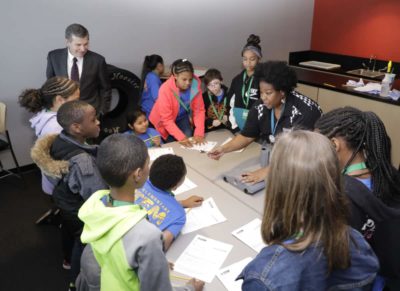Happy birthday to you, happy birthday to you… Thirty minutes after singing this song to my daughter for her third birthday, I was leaving the restaurant to take my father to the ER as his heart had decided it wasn’t up to tick, tick, ticking in a regular rhythm anymore. Two days later, he had a new pacemaker, and I had missed two days of work.
In early January, a call came in the middle of the night, in those hours when a phone ringing never means anything good. My father had been taken to the hospital, this time after having fallen in his apartment. The next day I missed another day of school, as I sat at the hospital trying to figure out what the next steps would be, realizing that returning him to his apartment was not going to be a possibility.
The year my daughter turned three and my father died, I was walking a tightrope, trying to stay upright as I tended to my father, whose body was failing him, and my daughter, who seemed to catch every germ that found its way into her preschool. When I was at work, I tried to be present and give my all. However, my year was punctuated with sporadic absences for situations out of my control. My principal could have labeled me a problem, considered me to be “chronically absent,” and made me feel bad about my inability to be at work periodically. Instead, I was treated with compassion from an administrator who understood that sometimes life happens in ways we can’t predict and don’t desire, yet must be dealt with.
Discussions are popping up in our state and others about whether chronic absenteeism is a “problem.” According to data compiled by the NC Department of Public Instruction, 22.6 percent of North Carolina teachers missed 10 or more non-consecutive sick days in the 2016-2017 school year. On the surface, the statistics seem startling, as if there is a dire issue that must be addressed. One could imagine hundreds of teachers simply taking a day off on a regular basis to have fun and skip out on their school responsibilities. However, when you dig beneath the surface, there are very reasonable explanations for why this might be happening. Let’s consider a couple of scenarios that differ from mine but still lead to perfectly reasonable reasons for “chronic absenteeism.”
A teacher named Mrs. Smith has three children of her own. Over the course of a school year, both of her school-age children get sick a couple of times apiece. Her new baby just started in daycare and, as is typical during the first year in a childcare setting, is sick multiple times. In addition, Mrs. Smith herself is sick a few times with viruses she picked up from her own kids and the kids she teaches. Now, go a step further and think about the fact that her own illnesses and those of her children might occur on nonconsecutive days. By all accounts, Mrs. Smith is an excellent teacher. In fact, just last year she was the district teacher of the year. Whenever she is at school, she is a rock star, beloved by her students and colleagues. Are her absences “chronic,” a word that implies there is some sort of problem, or a part of the normal ebb and flow that happens over a lifetime?
Mr. Lee was on his way to work when he stopped at a red light but the truck behind him didn’t. He misses a few days after the accident because he is having significant back pain. Over the next few months, the back injury periodically flares up, causing a day or two of incapacitating pain each time. He ends up going to see various specialists about his back issues and has several appointments that have to occur during the school day. To round things out, the specialists determine that he needs to have surgery ASAP, and he has to miss the last two weeks of the school year. Prior to this school year, Mr. Lee rarely missed a day of work. Should the unfortunate accident he had and subsequent number of related non-consecutive sick days he had to take be a matter of concern?
Tom Tomberlin was quoted in the News & Observer as saying, “If you see a career as a short-term prospect that you’re going to do for a little while till you get tired and want to do something different, sick leave can only be monetized by burning it as it’s accrued.” While the comment is offensive on multiple levels, the reality is that it is particularly out of touch when it comes to how teachers take leave. Whether teachers have a five or 10 or 15 or 20 or 25 or 30 year teaching career, they may have one or more years where a convergence of issues necessitates 10 or more non-consecutive missed days of work.
The fact that policymakers are worrying about “chronic absenteeism” smacks of trying to turn something into a problem where none exists. In actuality, chronic absenteeism is likely not truly the same “problem” when you dig into the individual stories behind the statistics. I can name teacher friend after friend who for at least one year of their career have been “chronically absent.” All of them are hardworking men and women who had a year of unexpected illnesses (their own and/or their family members) or other medical issues. Teachers are not able to work from home, so in a case of illness the choice becomes stay home or infect others. If a teacher’s child is sick, there is no choice at all but to stay home. Teachers are often so dedicated to coming to work that they take one sick day to try to recover from an illness, come back to work, and end up home again because they weren’t ready to come back in the first place.
Teachers earn sick days precisely to deal with medical emergencies and illnesses. In fact, earning one sick day per month is consistent with many other professional jobs. It is curious that the number of sick days teachers earn over a school year was used as the threshold for considering someone “chronically absent.” Are the days not given with the expectation that they might need to be used? For the person who misses 10 days over the course of the school year, they have worked 94.4 percent of the days students are present, hardly a “the sky is falling” type of situation.
Why work to try to find reasons to vilify teachers for taking sick days? The last thing we need is a new way to bash teachers and detract from the more serious issues facing our state. A much more productive endeavor would be to spend more energy working to advocate for improved teacher pay and working conditions. Given that North Carolina regularly ranks as one of the 10 worst states in the nation to work as a teacher, working on issues that could elevate the profession and help teachers desire to stay in it for the long haul would be a much better focus for our state leaders and policymakers to grapple with.





